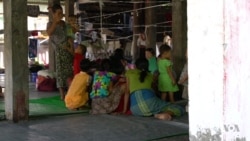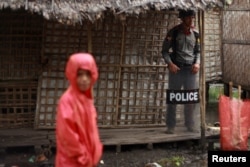More than 3,000 Rakhine Buddhists have been driven from their homes in Maynamar's Northern Rakhine state after a series of attacks by a group of suspected militants raised the possibility of another sectarian conflict.
Deaths of 9 policemen
Nine policemen died after a group, said to be 250 strong, raided their posts in Maungdaw township, a Muslim area in North West Myanmar, where the majority of the population are from the stateless Rohingya minority.
While eight of the militants died during the attack, the rest escaped with 51 weapons and 10,000 rounds of ammunition stolen from the local armory.
Several videos have emerged featuring a group of armed men making demands, in the Rohingya language, of the government of Myanmar also known as Burma.
Attack is blamed on a Muslim group
The office of President Htin Kyaw has attributed the violence to a previously unknown Rohingya group called the Aqa Mul Mujahidin, which they say has connections to foreign Islamic organizations.
No evidence has been provided to substantiate the claim and a government spokesman later said the statement was based on a preliminary investigation and has not been confirmed.
No civilian deaths have been recorded among the Rakhine community. But the attacks come only four years after a bloody outbreak of inter-communal violence between the state’s Muslim and Buddhist populations left over 100 dead.
Violence has caused Buddhists to flee
With these memories still raw, thousands of Buddhists have fled Maungdaw with many seeking refuge in monasteries across the state.
"Before they only set fire to our house, now they have guns it would be easy for them to attack again," said Ma Nyo from Kan Tha Yar village. “We do not know how long we are going to have to stay here, we want to go back to our homes, but if we do, then we will be attacked by Muslim terrorists.”
The Myanmar military claims to have killed 30 assailants in a counter insurgency operation launched over a week ago. With the entire "operation zone" on lock down, human rights groups have not been able to verify the statement and many fear it conceals the true impact that their mission is having on the Rohingya population.
"We can't be sure, but I think a lot more have died than government have said... And we know civilians are being killed, " said Chris Lewa from the Arakan project, an advocacy group with a network of sources across Maungdaw.
Thousands of Muslim Rohingyas living in Rakhine State
About 120,000 Rohingya have been living in IDP camps across Rakhine state since the last outbreak of violence in 2012. With the government releasing so few details about their operation in the North, rumors are spreading around the camps that a state wide crack down on the Rohingya is imminent.
"I’ve heard that the police are attacking Rohingya, burning their houses and killing people and now they want to search us too. There is already a curfew in the camps, so I think the conflict will come here soon," said Maung Maung from Baw Du Pha IDP camp.
The displaced Rohingya deny any association with the attackers in Maungdaw. "There are no terrorists here," asserted Kyan Thin.
The violence has disrupted medical services
Nevertheless, humanitarian assistance to the camps was temporarily suspended after the attacks amid security concerns.
This may have come at a grave expense for Sobaya. She was diagnosed with breast cancer two years ago. Shortly after the attacks in Maungdaw, an abscess on her left breast burst and became infected. Without medication, the infection has spread and Sobaya has developed a fever.
"For two weeks I have not been able to visit a clinic or get any medicine. Because of this, my wound is getting worse and will not stop bleeding" Sobaya says, as her neighbour mops her moist brow. "If I cannot get medicine then I think I might die and I will have to pass my child’s future over to Allah.”
Humanitarian assistance is slowly resuming in the camps. But with the militants still at large, the threat of another attack is possible. If the violence escalates, the fragile relationship between the Muslim Rohingya and the Buddhist Rakhine could take a long time to recover.














